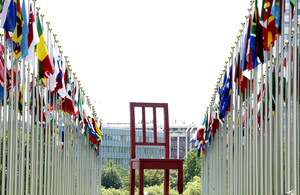UK government provides over £140 million of support for exports to Ghana
UK Export Finance (UKEF) has today announced it will provide over £140 million of financing to support UK exports to Ghana and help secure export opportunities for UK companies on major national infrastructure projects across the country.
This infrastructure support has helped to secure export opportunities for UK companies in healthcare, sanitation and transport across the country.
The support that UKEF has provided in Ghana includes:
- a direct loan of £27 million to the Ghanaian government will help UK-based Aqua Africa provide clean energy to sterilise drinking water for 225,000 people across the country. Aqua Africa will use solar powered technology to deliver 5 litres of water a day for less than a quarter of a penny.
- over £50 million will enable the construction of the new regional hospital in Koforidua. The project led by engineering companies Ellipse and Tyllium will provide 285 beds, a modern and fully functional hospital.
- over £70 million of financing in the form of direct loans and guarantees that will boost UK involvement in the redevelopment of a major commercial road between Tema and Aflao by construction company BHM International (UK) Ltd. This road links Ghana with close trading partners including Togo, Benin, Nigeria and Niger.
UKEF has also increased its country cover in 24 African nations this year, including for Ghana which has now doubled to £1.5 billion.
This announcement is part of HM government’s ambition to cover 80% of the UK’s trade with free trade agreements to strengthen the UK’s position as the trading partner of choice for countries in Africa.
Minister for Exports, Graham Stuart, said:
Building on the UK Africa Investment Summit in January this year, I’m delighted to see British capability being exported to Ghana and improving people’s lives across the country.
UK Export Finance supports UK exports at no cost to the taxpayer and has an important role in powering an export-led recovery from coronavirus (COVID-19) and giving UK exporters of all sizes a foothold in fast-growing markets across Africa and beyond.
Quotes from exporters
Aqua Africa’s Managing Director Philip Foster said:
We commend the tri-partnership approach between the government of Ghana, UKEF and the private sector in securing agreement for this vital social impact investment project that will provide access to clean water to over 225,000 Ghanaians, in support of Ghana’s ‘Water for All’ policy aligned with the SDG agenda.
We are looking forward to implementing this project and to developing the relationship that will deliver further projects that are planned to follow.
Bruno Schambacher, CEO of Tyllium, said:
UKEF’s support is allowing EPC companies like ours to take full advantage of the new trading opportunities created by the rise of developing economies like Ghana. Their flexible finance was at the core of our successful bid.
Olivier Picard, CEO of Ellipse Projects, said:
Our company operates actively in Africa and is already present in Ghana in the health sector. We are pleased that UK Export Finance is supporting us as we secure these exciting contracts. UKEF’s flexible finance demonstrates the government’s true commitment to the growth of UK exports.
Phil Atkinson International Director of BHM Construction International UK said:
Securing this project has been dependent on the world class support provided by UKEF. It shows the commitment of the UK government in supporting exporters as they establish new trading relationships across Africa.
Through the combined assistance of the Ghana Ministry and Roads and UKEF, our team are committed to the development of this critical infrastructure to provide a safe, efficient and reliable road transport system and foster economic growth within Ghana and the region at large.
Ed Harkins, Managing Director of GKB Ventures, who acted as ECA Advisor to Tylllium and BHM, said:
We are delighted to have been appointed as ECA advisor by both BHM and Tyllium on these important infrastructure projects in Ghana. We were able to work with our clients, the banks and the team at UK Export Finance to ensure that the funding was closed in a timely manner in an extremely volatile funding market.
The support UK Export Finance provided through its direct lending facility was essential to ensuring that these vital projects could be funded through a long-term affordable funding solution for the government of Ghana.
GKB has now completed three UKEF supported projects for our clients in Ghana. In each case the support provided by UKEF was a key to ensuring our clients were able to unlock much needed new export contracts.
